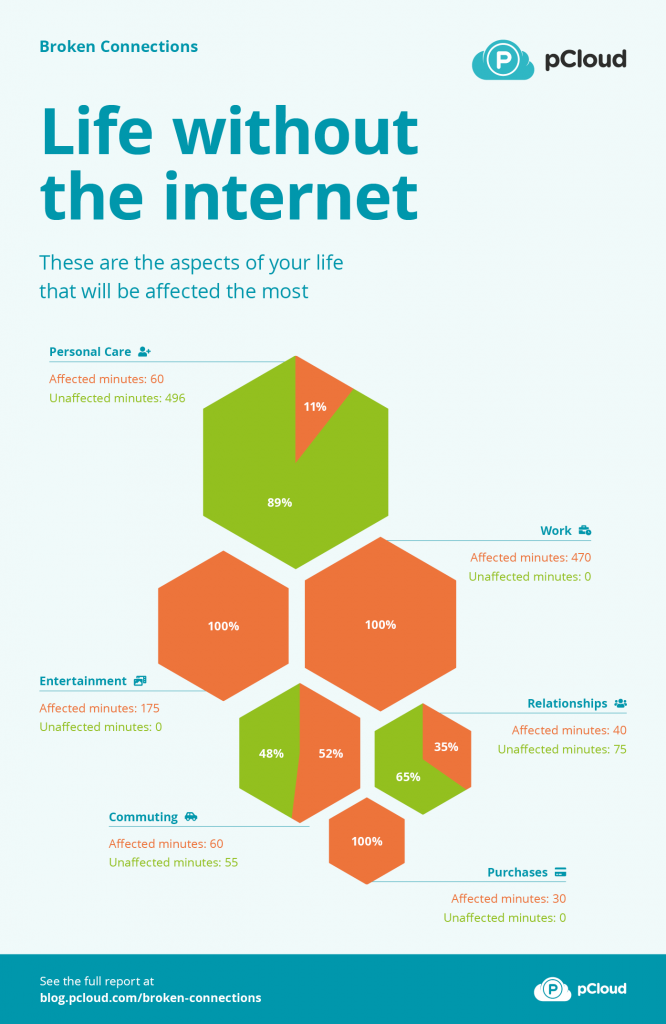How does the internet impact our daily routine?

In today’s society, the internet is more than just a way to communicate with friends, but an integral part in maintaining normality in our lives. Not only are we dependent on the internet to access files, send emails and check social media, but it also controls other aspects of our life, like traffic control, which we unknowingly take for granted.
So what would happen to our daily routine if the internet went down for the day?
Our study created an average daily routine to analyze what in our day would be affected if the internet went down for 24 hours. The study categorized the day into six activity types: personal care, relationships, commuting, entertainment, purchases, and work to allow us to visualize which activities are heavily reliant on the internet and which were impacted the least. Here are our results…

60% of our daily routine is reliant on the internet!
Work
The internet affects 100% of your working day
The internet is at the heart of a working day for the average person, with work calls, meetings, emails, and research all heavily reliant on having access to the internet. It’s nearly impossible to pursue a normal working day without it. With remote working on the rise, businesses are more reliant than ever on the internet to keep employees connected, with access to online resources and fast communication an essential part of this new way of working.
Commuting
Delays and canceled services, with no way to get updates
Whatever way you travel to work, a lack of internet will probably hinder you. From a complete collapse of the Metro system to no access to online travel tickets and train delays due to communication issues, public transport is likely to be a nightmare. If you’re lucky enough to travel by car, you’ll still encounter problems, with no Google traffic updates to help avoid traffic jams, and a high probability GPS would fail.
Entertainment
Netflix, Spotify, and Instagram are entirely dependent on using the internet
100% of our daily entertainment routine revolves around using the internet. We use it to stream videos, check our social media and to consume the news. So a day without the internet means no streaming music in the shower or on the way to work, and no more binge-watching Netflix series.
Purchases
You’d only be able to spend the money in your pocket
100% of our purchases would be affected in our usual daily routine, as there would be no contactless payments in your favorite lunchtime spot. Without the internet, all card payments would be impossible, ATMs would fail, leaving you with just the money in your pocket or a trip to the bank. You wouldn’t be able to squeeze any online shopping into your lunch hour, and even deliveries of previous orders made would be delayed, with delivery companies unable to access their online systems.
Personal care
This does not require the internet
Luckily, personal care is hardly impacted by the internet – affecting only 11% of this part of our daily routine. The fundamental basics of living, such as eating, sleeping, showering and exercising do not depend on the internet and thus can be achieved without it. A day without the internet may alter our approach to these activities, such as being unable to look up a recipe or access your gym membership, however it would not be not impossible to achieve these tasks.
Relationships
Face to face socialising would save the day
Creating time to spend with friends and family is the second least affected by the internet. Sometimes phones can hinder being present while socializing, therefore a lack of internet may benefit your social interactions. However 35% of our social interactions would be affected, as we wouldn’t be able to use online messaging or access group chats, and those daily phone calls or FaceTimes to loved ones who aren’t close by would have to be put on hold for a day. With the internet down, there would be an overload on telecommunication services, causing mobile lines to go down, leaving landlines as callers’ only form of distanced communication.
Which cities are the most reliant on the internet?
According to government data, 91% of the UK regularly use the internet and would be lost without it. With 66% of the average person’s day completely reliant on it, our study then looked at which cities in the UK would suffer the most if the internet actually did break for 24hours.
The study analyzed how reliant on the internet each city is by seeing what percent of its population has used the internet recently, ordering them from highest to lowest.
The top 10 most impacted cities
Residents in Edinburgh are most reliant on the internet in the UK
| City | % using the internet |
| Edinburgh | 96.1 |
| Bristol | 95.4 |
| Swindon | 95.3 |
| Leeds | 94.9 |
| Nottingham | 94.9 |
| Bedford | 94.9 |
| Cardiff | 94.9 |
| Bournemouth | 94.8 |
| Aberdeen | 93.7 |
| Southampton | 93.6 |
The city which would find it hardest to cope without the internet for a day would be Edinburgh, as an incredible 96.1% of their population have used the internet recently, followed by Bristol at 95.4%.
Wolverhampton is the city least reliant on the internet in the UK
| City | % using the internet |
| Wolverhampton | 77.1 |
| Sunderland | 79.5 |
| Darlington | 82.4 |
| Glasgow | 83.3 |
| Stoke-on-Trent | 83.6 |
| Liverpool | 84.6 |
| Coventry | 84.8 |
| Derby | 85.3 |
| Hull | 85.8 |
| Warrington | 86.7 |
These bottom 10 cities would be the most able to cope without the internet for a day, with the smallest proportions of their populations using it recently. Wolverhampton would find it easiest, with just 77.1% of its population using it recently, followed by Sunderland at 79.5%.
How to keep your data safe when the internet is down
The internet may be down but all is not lost. Storing your data in the cloud ensures that your data is safe and secure no matter the circumstances. Whether it’s for personal, family, or business use, as Europe’s most secure cloud storage, you can store your files safely. If you opt to be able to use the files offline, you can even access them with no internet, using just one simple platform anywhere you go. If you are using an alternative cloud service that, unlike pCloud, is reliant on Google Drive, Microsoft OneDrive or Dropbox rented AWS servers, it will take longer for you to regain access to your files.
Methodology
The study created an average daily routine using a variety of sources, including The Mirror and Business Insider, detailing the average routine of someone in the UK. These activities were then analyzed to determine what portion of each required the internet.
The study categorized the day into six activity types: personal care, relationships, commuting, entertainment and work, which then allowed us to calculate the exact percentages of these categories that were impacted the most, by comparing the time affected vs the time not affected.
Government data that detailed the percentage of the population by the geographical location that have used the internet in the last three months was then used to establish which cities are the most reliant on the internet.


